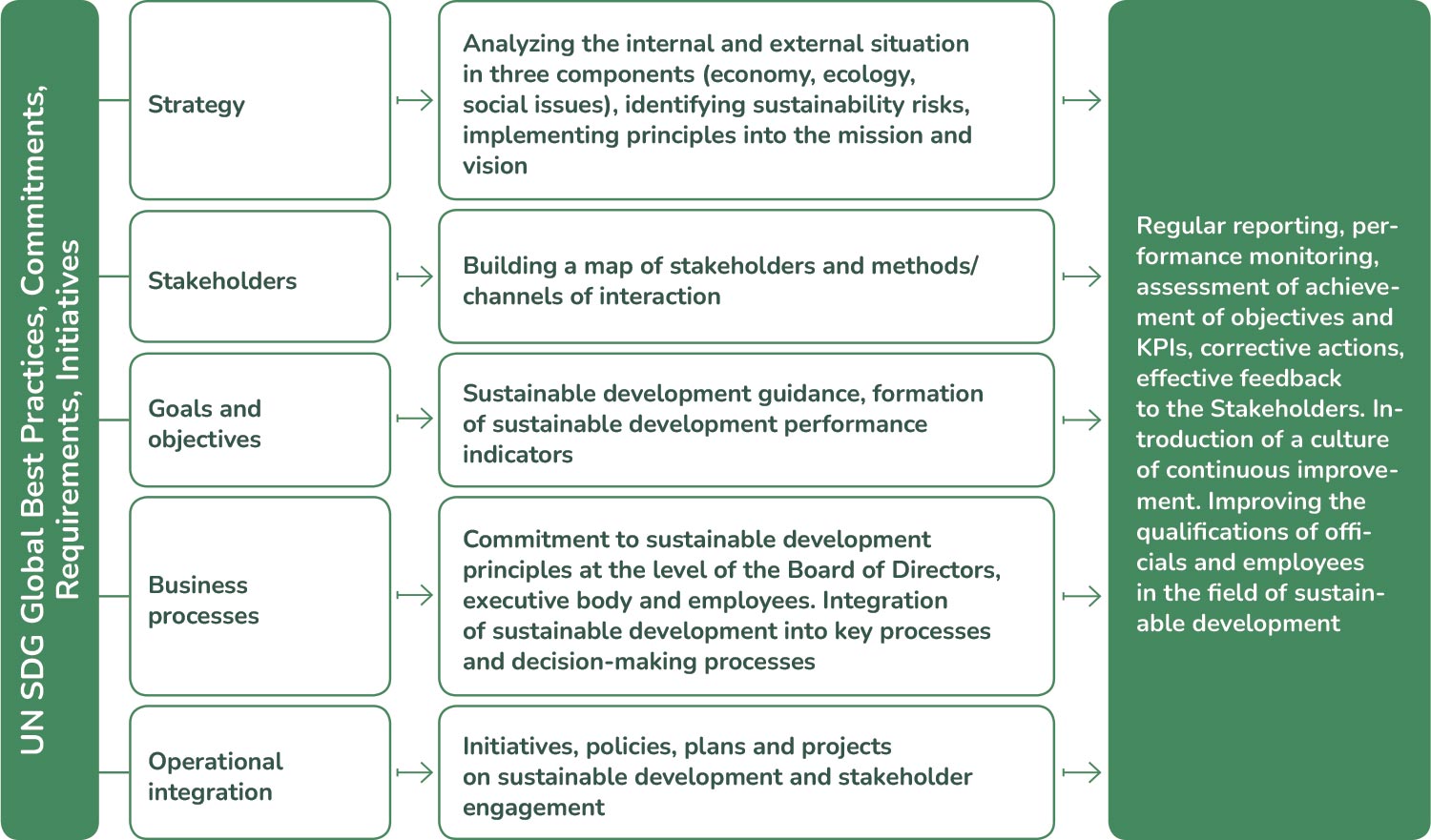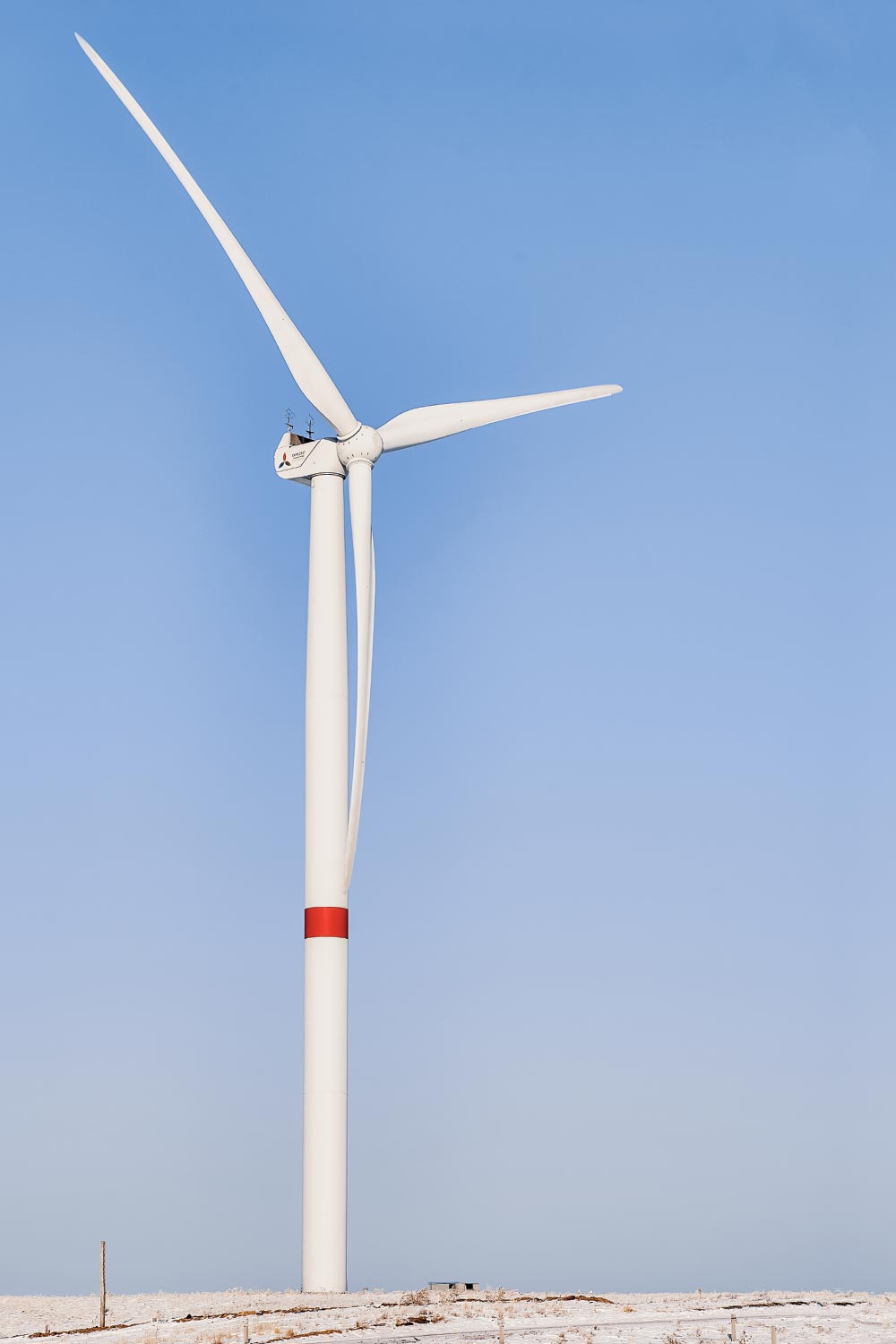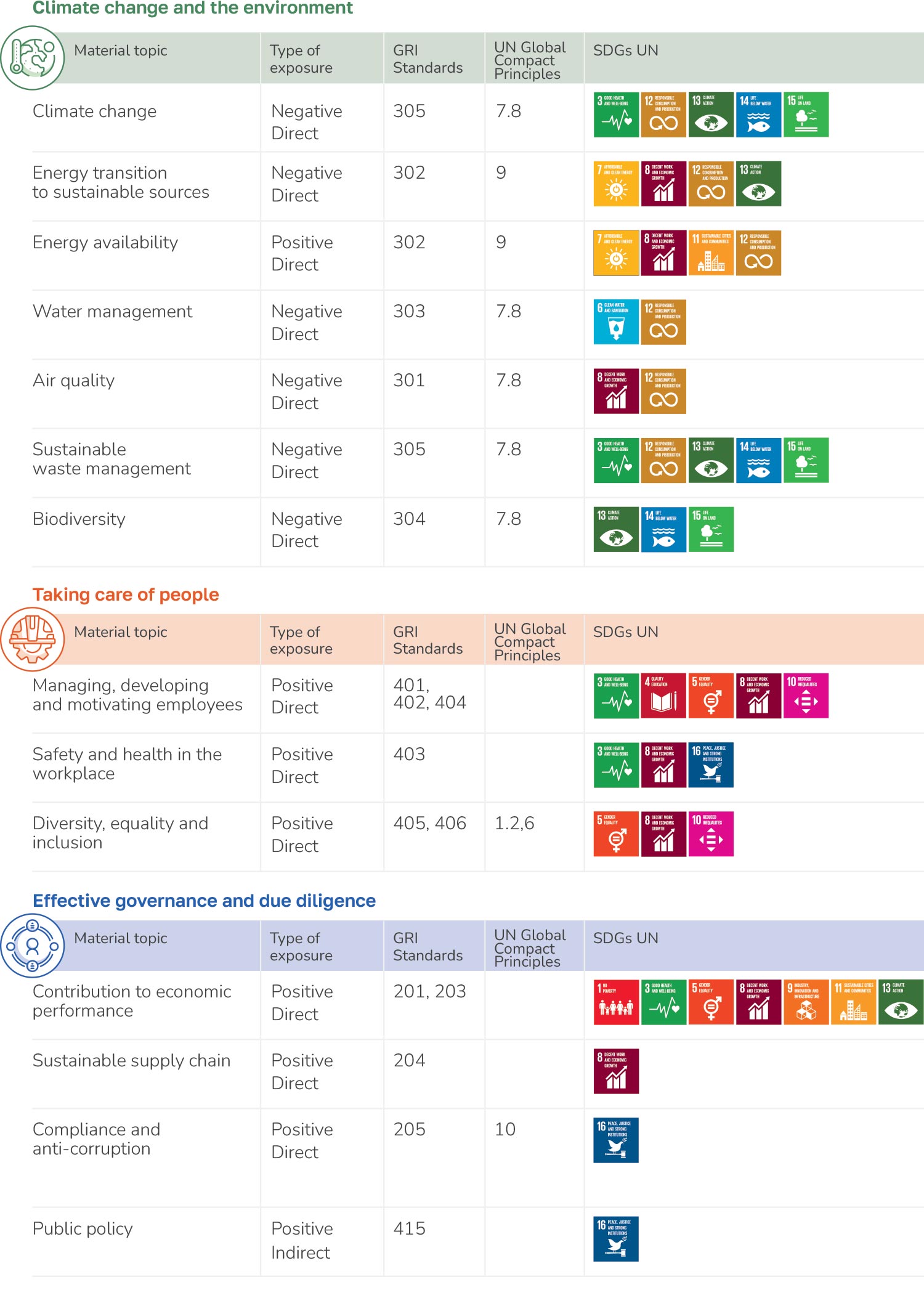Sustainable development management
We are convinced that effective management of ESG aspects allows us to achieve high results and effectively create value in the long term. The sustainable development agenda according to the Development Strategy of Samruk-Energy JSC for 2022-2031 is taken into account when making key decisions, working with stakeholders and is a reference point for the Company's development.
Our approach
Components of Sustainable Development of Samruk-Energy JSC
Samruk-Energy JSC actively integrates the principles of sustainable development into its strategy to achieve the Company's mission and vision. We strive to overcome global challenges and risks related to sustainable development to ensure economic development and reliable supply of electricity and heat. And aim to effectively manage impacts on society and the environment.
The Company makes voluntary commitments to responsible business conduct, human rights protection and community participation, seeking to balance the interests of all stakeholders. We carry out our sustainability activities based on global best practices and keep abreast of changes in standards and expectations, integrating them into our ESG Practices.
Sustainable development in Samruk-Energy JSC includes three components:
- The economic component of the Company's sustainable development is aimed at the growth of long-term value, ensuring the interests of shareholders and investors, increasing the efficiency of processes, increasing investments in the creation and development of more advanced technologies, and improving labor productivity.
- The environmental component is aimed at minimizing the impact on biological and physical natural systems, optimal use of limited resources, application of environmentally friendly, energy- and material-saving technologies, creation of environmentally acceptable products, minimization, recycling and destruction of waste.
- The social component is focused on the principles of social responsibility, which include, among other things: ensuring occupational safety and preserving personnel health, fair remuneration and respect for employee rights, individual development of personnel, implementation of social programs for personnel, creation of new jobs, sponsorship and charity, environmental and educational activities.
We set the Company's sustainability priorities at the strategic level. Our management system then allows us to drill down to the project and program level, effectively measuring performance and disclosing information.
Sustainable development management

Samruk-Energy JSC integrates responsible business commitments at all management levels, including top management and operational levels, such as human resource management, investment activities, environmental risks, procurement procedures and internal audit. We strive for transparency and legality in all aspects of our operations, adhering to high standards of business ethics. We work to implement our policies and ESG principles both internally and in our dealings with external partners and clients.
The Board of Directors is responsible for strategic guidance and oversight of the implementation of sustainability principles. The Board of Directors approves relevant policies, approves key performance indicators and monitors the fulfillment of the Company's commitments.
The Executive Body, within the scope of its authority, carries out work on the implementation of sustainability principles, compliance procedures, execution of policies and communicates its results to the Board of Directors.
The Sustainability Guidelines regulate our ESG activities and are based on the principle of ensuring fundamental human rights and freedoms. The document expresses the Company's position on supporting internationally proclaimed human rights not only within the framework of the Company itself, but also in relation to third parties with whom Samruk-Energy JSC works. For more information, please click here: Sustainability Guidelines.
As part of ensuring the successful fulfillment of our commitments and developing a corporate culture focused on social and environmental responsibility, annual sustainability training is provided to management and employees.
To promote ethics and human rights protection throughout the value chain, we have developed and implemented Supplier Guidelines.
As part of our compliance system, we monitor compliance with legal regulations and ensure zero tolerance for corruption and bribery, building an anti-corruption culture and preventing compliance risks.
In 2023, the Company conducted a diagnostic of the current level of development of ESG issues management practices. Based on the Diagnostics, a Roadmap for improvement of the sustainability management system for 2023-2024 was developed, the results of which are reported to the Company's Board of Directors on a quarterly basis.
Sustainable Development Management in Samruk-Energy JSC
Risk management is integral to sustainable development. We are committed to timely assessment, control and management of risks, including economic, environmental and social aspects, for both internal and external stakeholders.
The key groups of sustainability risks are:
- Social risks include human resource management issues, impacts on local communities, and human rights;
- Environmental risks cover environmental impacts and climate change;
- Economic risks include economic impacts on the community and the country as a whole.
We assess risks using a systems approach to sustainability:
- We assess current and future risks associated with global sustainability drivers;
- Forecast economic, socio-demographic and environmental trends;
- Analyze social, environmental and economic aspects of regional impacts;
- Develop measures to manage impacts, reduce risks and realize opportunities;
- Enhance risk culture and evaluate the effectiveness of risk management measures.
More details on Risks in the Risk Management and Internal Control section
Sustainable development risk management
Samruk-Energy JSC implements initiatives and programs in the field of sustainable development in the following directions:
- introduction of high ethical standards and building a corporate culture based on trust;
- introduction of sustainable development principles and application of risk-oriented approach in the practice of project management at all investment stages;
- improving financial stability;
- promoting responsible procurement based on the principles of fair and free competition, mutual benefit, transparency and full responsibility for the commitments undertaken;
- improving safety culture by involving the Company's employees in the management of occupational safety issues and increasing the efficiency of the occupational safety management system control in accordance with international standards;
- improving the Company's social responsibility, adhering to the principles of the UN Global Compact, and investing in human capital;
- ensuring environmental sustainability, including the search for and implementation of environmentally and economically best technologies, optimization of production processes, implementation of projects using renewable energy sources, identification and prevention of potential emergencies.
To determine the list of sustainability initiatives, we considered a wide range of topics worthy of attention, including the materiality matrix and sustainability risks.
With a plan for sustainable development initiatives is available here: https://www.samruk-energy.kz /images/documents /plan_iniciativ_se_ru.pdf
Key events in the field of sustainable development in 2023
Morningstar Sustainalytics, an international rating agency, conducted a comprehensive study of Samruk-Energy JSC activity efficiency (ecology, social responsibility, corporate governance — ESG) for 2022, according to the results of which ESG Risk Rating was assigned — 24.1 points, which corresponds to Medium Risk level according to the Sustainalytics scale. According to the results of assessment among the world's electric power companies, Samruk-Energy JSC entered the top 20% of the best companies in the sub-sector ‘Electric Power Industry’ allocated by Sustainalytics, taking 43rd place out of 273.
On July 27, 2023, Samruk-Energy JSC disclosed information on the Carbon Disclosure Project (CDP). Disclosure of information on CDP climate questionnaires is a tool for effective carbon footprint management to achieve carbon neutrality based on a reasonable balance between energy and environmental security. The questionnaire was completed on two questionnaires: Climate Change and Water Security. For the two questionnaires, the results of the first year of disclosure are rated with a score of D.
In 2023 the implementation of the project: ‘Action Plan and Disclosure on TCFD recommendations (Task Force on Climate-related Financial Disclosures — a standard for maintaining reports that disclose information on the possible impact of climate change on the global economy)’ was started. Currently, a gap analysis of Samruk-Energy JSC's corporate governance practices in the area of climate change and TCFD disclosures is being conducted, and the maturity of Samruk-Energy JSC's corporate governance practices in the area of climate change is being assessed taking into account TCFD recommendations. The project started at the end of October 2023 and will be completed at the end of April 2024.
On December 25, 2023, a new version of the Code of Conduct was approved by the Board of Directors of Samruk-Energy JSC (Minutes No. 18/23).
Within the framework of the principle of social responsibility of business, in 2023 the Company approved the Policy on interaction with local communities of the Group of companies of Samruk-Energy JSC (approved by the decision of the Management Board No. 40 dated December 28, 2023). The Policy regulates the principles of activity, obligations, initiatives in the field of interaction with local communities of the Company, as well as interaction mechanisms and methods of providing feedback and information disclosure with local communities in the regions of presence.
The Road Map for Improvement of Sustainable Development Management System was approved, which included the measures of the Plan for Improvement of Corporate Governance of Samruk-Energy JSC for 2022-2023, the Action Plan for Implementation of Best Practices of Corporate Governance of Samruk-Energy JSC and the Road Map for Improvement of Sustainable Development Management System.
Samruk-Energy JSC entered the top 20% of the best companies in the sub-sector ‘Electric Power Industry’ allocated by Sustainalytics, taking
43
rd place out of 273
Raising awareness of sustainable development issues
Following the best international practices, we raise awareness of sustainable development issues:
- During the second quarter of 2023, corporate training for employees at all levels was organized on topics including climate change, carbon footprint reduction, RES development, energy efficiency, etc.
- On December 14, 2023, a meeting with participation of corporate secretaries was organized for portfolio companies of Samruk-Energy JSC on the topic: ‘ESG Trends 2023. Corporate Governance and Sustainable Development in the Group of Companies of Samruk-Energy JSC based on the results of 2023’.
- On December 21, 2023, a corporate seminar was organized for the Company's management and employees on the topic: ‘Risk Management and Internal Control’ from KPMG.
- On December 27 and 28, 2023, experts from PricewaterhouseCoopers LLP conducted a corporate training on ‘Current Issues in ESG’. The training was attended by members of the Board of Directors, the Management Board, directors of structural divisions and specialists, as well as representatives of subsidiaries and affiliates.
- On December 29, 2023, an Annual Strategy Session was organized with members of the Management Board, directors of structural divisions and specialists on the results of the year on the topic ‘Corporate Governance and Sustainable Development. ESG Rating’.
ESG KPIs defined by Samruk-Energy JSC
We have implemented key performance indicators (KPIs) on environmental, social and corporate governance (ESG) aspects, reflecting the Company's commitment to sustainable development. The introduction of ESG KPIs allows the Company to form a clear system of metrics aimed at supporting and developing sustainable development practices.
The ESG KPIs are categorized into three thematic aspects:
- Occupational Health and Safety; ;
- Human Resources Management;
- Environmental protection.

Occupational health and safety
Status of fulfillment of the established ESG KPIs
- The first manager of the Company has a KPI ‘LTIFR’, with a target value of 0.30. The ‘LTIFR’ KPI for 2023 was 0.36 and was calculated for 11 accidents, 1 of which occurred in 2022 but was recorded in 2023 due to the actual completion of the investigation in the reporting period. However, in the context of the GRI 403-9 standard, in this Annual Report the LTIFR for 2023 is presented at the level of 0.33, calculated for 10 actually occurred cases in the reporting year.
- Samruk Business Academy, a private institution, trained internal trainers of the Company's subsidiaries and affiliates in the course ‘Safe Work Culture’ for further training of employees of SDCs. The management and heads of structural subdivisions of SDCs were trained under the international programs ‘NEBOSH’ and ‘IOSH’.
- A schedule for conducting leadership behavioral safety audits (LBSA) for the first managers of SDCs was drawn up. The management of subsidiaries and affiliates held discussions with employees to identify shortcomings, pay attention to safety conditions, identify systematic causes when performing production tasks, assess the effectiveness of the workplace culture, and identify weaknesses in the occupational safety management system. For each LBSA conducted, reports were compiled and analyzed to monitor the implementation of corrective actions.
- Automated the system for recording HS incidents, potential-hazardous incidents and events through the implementation of the Safe Production Project.
Human Resources Management
Status of fulfillment of the established ESG KPIs
- During 2023, on a quarterly basis, PI ‘Center for Social Interaction and Communications’ conducted research of social stability indicators for the Group of companies of Samruk-Energy JSC.
- SRS Index of Samruk-Energy JSC — 59%.
- Engagement Index of Samruk-Energy JSC — 58%.
- Social Well-being Index of Samruk-Energy JSC — 43%.
- Social peace index of Samruk-Energy JSC — 72%.
Environmental protection
Status of fulfillment of the established ESG KPIs
- For 2023, the KPI ‘Indicator of environmental friendliness of generated electricity. Volume of CO/SOx/NOx/solids emissions per 1 kWh’ with a target value of 10.1 g/kWh.
- Based on the results of 2023, the specific pollutant emission for the Group of companies of Samruk-Energy JSC amounted to 9.537 g/kWh.
Plans for 2024 and the medium term
In 2024, we plan to continue to improve our sustainability management practices, including:
- Bringing all of the Company's IRD in line with the norms of the updated Corporate Governance Code;
- Further implementation of the TCFD Action Plan and Disclosure project;
- Implementation of measures of the Roadmap for improvement of the sustainable development management system of Samruk-Energy JSC for 2024, updated based on the results of the study of the efficiency of Samruk-Energy JSC's ESG risk management activities, approved by the Board of Directors on February 26, 2024;
- Receipt of ESG risk rating based on the results of 2023;
- Disclosure of information on the Carbon Disclosure Project (Carbon Disclosure Project).



